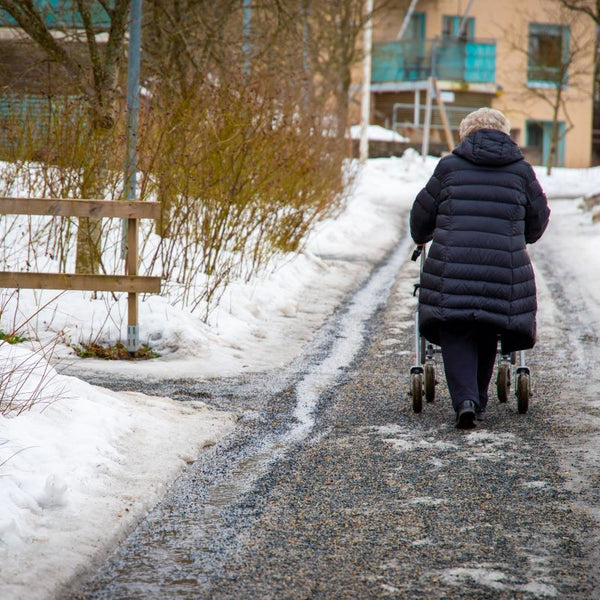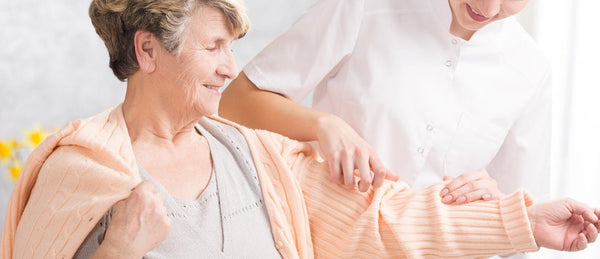Elder abuse is a concerning yet often hidden issue that affects elderly people across the world. In fact, according to recent statistics, it’s estimated that more than 300,000 older adults in the UK are likely to have experienced domestic abuse between May 2022 and April 2023.
From physical to mental and financial abuse, there are various forms of mistreatment that elderly people might be facing, each with its own distinct signs and consequences.
In today’s article, we’ll explain what elderly abuse looks like, discuss its common signs and provide advice on how to protect older adults from becoming victims of abuse.
Jump to:
What is elder abuse
Elder abuse is a term referring to any form of neglect or mistreatment of older adults perpetrated by family members, caregivers, health care professionals or other people in an elderly person’s surroundings.
Elder abuse can occur in various settings, including the elderly person’s home, assisted living facilities, or even in hospitals.
The most common forms of elder abuse include:
Physical abuse
Physical abuse involves the use of physical force on elderly people, causing pain, bodily injuries and other physical impairments. For elderly people, physical abuse can have very serious, even fatal consequences, as their bodies are getting weaker and their ability to recover from injuries is significantly lower.

Emotional and mental abuse
In the form of threats, humiliation or harassment, emotional abuse occurs when a person purposely inflicts emotional pain and distress on an elderly individual. Emotional abuse can also involve controlling an older adult’s freedom and intentionally causing feelings of isolation and low self-esteem.
Financial abuse
Financial abuse is another common way of mistreating elderly people, involving illegally or improperly using a senior’s money, assets, or property. This can range from stealing cash to forcing an elderly person into signing financial documents.
Sexual abuse
Any non-consensual sexual contact with an elderly person is categorised as sexual abuse. From unwanted touching to sexual assault and forced nudity, all these forms of sexual abuse can lead to physical injuries as well as psychological trauma.
Neglect
While neglect might not involve direct physical harm, it’s still considered a form of elder abuse, as it can result in serious physical harm and mental distress to an elderly person. Neglect can involve not providing adequate food, water, shelter, medical care or personal hygiene to an elderly individual.
Abandonment
Similarly, abandonment is a form of abuse when a caregiver deserts an elderly person who needs their care and support. Indicators of abandonment may be that an elderly person is left alone in inappropriate settings, such as a hospital or public place, without any means of care.
How to get help in an emergency
An emergency button or panic alarm will quickly connect you to a 24-hour monitoring centre if you need help.
Signs of elder abuse
Recognising the signs of elder abuse as early as possible is crucial to protecting vulnerable individuals and making sure they receive all the care, support and respect they deserve.
There are various signs indicating elder abuse. However, as already mentioned, elder abuse is often hidden. Whether elderly people don’t identify what’s happening to them as abuse, or feel ashamed or unable to ask for help, it is very common for those suffering from abuse to cover up the signs.
Here are some common signs to watch for across different types of abuse:
Signs of physical abuse
- Unexplained injuries, such as bruises, welts, cuts or fractures
- Frequent hospital visits
- Behavioural changes, with elderly people appearing fearful, anxious or depressed
Signs of mental abuse
- Sudden changes in mood or behaviour, such as becoming withdrawn, agitated, or upset
- Signs of fear, anxiety, or nervousness around specific people or when asked about them
- Loss of interest in activities, hobbies and social interactions
Signs of financial abuse
- Sudden financial changes, such as unexplained withdrawals from bank accounts, changes in wills or power of attorney, or missing valuables
- Unpaid bills despite having adequate financial resources
- An unusual level of control by another person over the elder’s finances
Signs of sexual abuse
- Physical injuries around intimate parts of the body
- Problems walking or sitting
- Social withdrawal and sudden changes in behaviour
- Developing a sexually transmitted disease (STD)
Signs of neglect and abandonment
- Noticeable weight loss, sunken eyes, dry skin, or other signs of malnutrition and dehydration
- Signs of inadequate hygiene, such as dirty clothes, unwashed hair, and body odour
- Living in a home with dirty conditions, lack of heat or electricity, pest infestations, or other unsafe conditions
While each form of elder abuse has its specific indications, it’s important to remember that particular signs can signal multiple serious issues and challenges an elderly person might be facing. Therefore, if you spot any physical, mental or behavioural changes in your elderly loved one, take action as soon as possible and seek professional intervention if needed.
Elderly abuse in the UK
But what are the steps to take when spotting signs of elder abuse? First of all, the most important thing is to be vigilant and pay attention to any red flags that might occur in an elderly person’s day-to-day life. Whether it’s changes in behaviour, emotional withdrawal or repetitive physical injuries, it’s always better to raise a false alarm than overlook a serious issue.
Afterwards, try to initiate an open and honest conversation with an elderly person, expressing your concerns and showing them your support and willingness to help. Based on the signs the person is showing, you should call for appropriate help from a dedicated professional or authority.
In the UK, there are numerous ways of help and support you can seek when suspecting elder abuse. These include:
Local police
If you think your elderly loved one is suffering from abuse or neglect, you should contact your local police by dialling 101. The authorities will investigate the situation and take the best course of action, ensuring the safety of the concerned person. However, in the case of immediate danger, remember to always call 999.
Citizen Advice Bureau
Citizen Advice Bureau offers a free Elder Abuse Helpline, providing essential support to people suffering from any form of abuse and giving helpful advice on the nearest elder abuse services.
Charity organisations
In the UK, there are also a number of charities and non-profit organisations, offering help and support to people and families facing any form of abuse. Some of these organisations include AgeUK, Hourglass, or Victim Support.

Elderly safeguarding
Elderly safeguarding means protecting older adults from abuse and neglect, making sure they can live safely and free from any kind of mistreatment.
In fact, elderly safeguarding is a part of The Care Act 2014, setting a clear legal framework for how local authorities and other elements of the system should protect adults at risk of abuse and neglect.
It’s a practice that concerns family members, caregivers and other people surrounding an elderly individual, aiming to prevent any harmful behaviour towards elderly people and ensuring their safety and wellbeing. In other words, elderly safeguarding is a collective responsibility that requires the involvement of individuals, communities and institutions, aiming to create a safer environment for the elderly population.
Some of the elderly safeguarding responsibilities include:
- Protecting elderly individuals from abuse, neglect and other forms of mistreatment
- Raising awareness of elder abuse through community programs, media campaigns, and educational materials
- Educating older adults about their rights, the types of abuse and how to seek help
- Providing legal aid and support for elderly individuals who have experienced abuse
- Monitoring the quality of care provided in nursing homes, assisted living facilities, and home care settings
- Offering counselling and mental health services to elderly individuals who have experienced abuse
- Establishing emergency shelters and safe spaces for elderly individuals who need immediate protection from abusive situations
Overall, elder abuse is a serious issue affecting older adults in various settings and situations. Recognising early signs of any form of mistreatment is crucial to addressing the issue, preventing further harm and restoring an elderly person’s safety and wellbeing.
If you’re concerned about your elderly loved one living independently, you might also want to consider using one of our personal alarms, bringing you additional peace of mind. TakingCare's Emergency Resolution Team is there 24 hours a day, every day of the year, to provide assistance if the alarm wearer is concerned or hurt and can help provide access to support services if needed.





